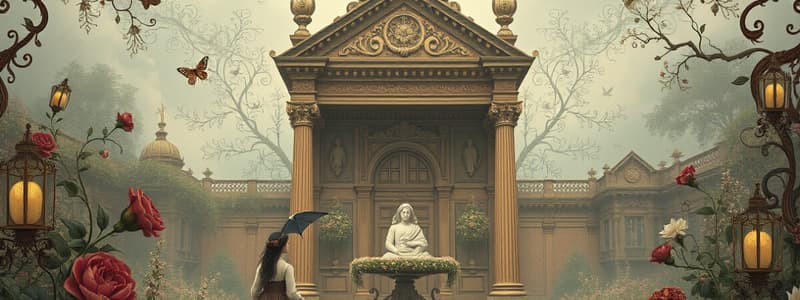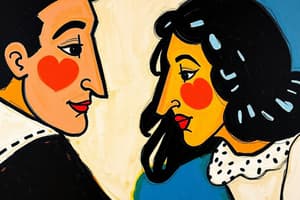Podcast
Questions and Answers
What is The Pleiade?
What is The Pleiade?
An ancient group of seven authors and a collection of critics and poets in France in the second half of the 16th century.
What are Pleiades Comedies characterized by?
What are Pleiades Comedies characterized by?
Classical in form, resembling medieval farces in subject and dealing primarily with urban, amoral, middle-class characters motivated by sex and money.
What defines Pleiades Tragedies?
What defines Pleiades Tragedies?
Classical in form with biblical subjects and little tension or suspense.
Who is Alexandre Hardy?
Who is Alexandre Hardy?
What is Neoclassical drama?
What is Neoclassical drama?
What does decorum refer to?
What does decorum refer to?
Plays that did not display life as it really is are said to have offended __________.
Plays that did not display life as it really is are said to have offended __________.
What is the principle of Purity of Genre?
What is the principle of Purity of Genre?
Who was Louis XIV?
Who was Louis XIV?
Who is Jean de Mairet?
Who is Jean de Mairet?
What is Jean Chapelain known for?
What is Jean Chapelain known for?
Who was George de Scudery?
Who was George de Scudery?
Who was Armande Bejart?
Who was Armande Bejart?
What are Scudery's Six Characteristics of Good Action?
What are Scudery's Six Characteristics of Good Action?
Who is Moliere?
Who is Moliere?
Which of the following are Moliere's plays? (Select all that apply)
Which of the following are Moliere's plays? (Select all that apply)
What are Moliere's Comedy Characteristics?
What are Moliere's Comedy Characteristics?
Who is Jean Racine?
Who is Jean Racine?
What are Racine's Tragedy Characteristics?
What are Racine's Tragedy Characteristics?
Who is Pierre Corneille?
Who is Pierre Corneille?
Which of the following are Corneille's plays? (Select all that apply)
Which of the following are Corneille's plays? (Select all that apply)
What was the Battle of Ancients and Moderns?
What was the Battle of Ancients and Moderns?
What was the Le Cid Controversy?
What was the Le Cid Controversy?
What did Moliere aim to achieve in his controversies?
What did Moliere aim to achieve in his controversies?
What is a prologuist?
What is a prologuist?
What does the term doyen refer to?
What does the term doyen refer to?
What was the Sharing Plan in theatre?
What was the Sharing Plan in theatre?
What are Societaires?
What are Societaires?
What did Pensionnaires do?
What did Pensionnaires do?
What were machine plays?
What were machine plays?
What is La Fonda?
What is La Fonda?
What is the Tuileries Palace known for?
What is the Tuileries Palace known for?
Who built the Palais Cardinal?
Who built the Palais Cardinal?
What is the Académie Française?
What is the Académie Française?
Flashcards are hidden until you start studying
Study Notes
The Pleiade
- A group of seven authors influential in 16th-century France, named after a constellation.
- Key figures include Pierre Ronsard, Du Bellay, and Desportes, focusing on a new vernacular literature.
- Aimed to enrich the French language by coining new words, borrowing from Greek and Latin, and restoring native words.
Pleiades Comedies
- Classical in form, echoing medieval farces.
- Focused on urban, amoral middle-class characters driven by sex and money.
Pleiades Tragedies
- Based on classical or biblical subjects, lacking tension or suspense.
- Characterized by suffering as a result of fate, often expressed through set speeches.
Alexandre Hardy
- Recognized as the first professional playwright in France.
- Authored around 500 plays, 34 of which survive today.
- Disregarded the rules of The Unities and bienséance, presenting diverse actions and violent themes.
Neoclassical Drama
- Drama conforming to neoclassical rules from the English Renaissance's end to the French Revolution.
- Comprises exclusively comedies or tragedies, with no blending of genres.
Decorum
- A principle in classical rhetoric emphasizing appropriateness in style and material based on subject and audience.
- Applies to social behavior limits.
Verisimilitude
- A core concept in French neoclassicism signifying "truthfulness."
- Plays offending this principle depict life unrealistically.
Purity of Genre
- Strict prohibition against mixing genres in plays, forbidding comic elements in serious works.
Louis XIV
- Absolute monarch, known as the Sun King, reigned from 1638 to 1715.
- Key achievement includes the construction of the Palace of Versailles.
Jean de Mairet
- A classical French dramatist and a rival of Pierre Corneille (1604-1686).
- He introduced notable characters to the stage, influencing his contemporaries.
Jean Chapelain
- First leader of the Académie Française and author of "The Judgement of Le Cid."
George de Scudéry
- Notable dramatist and rival of Corneille, engaged in literary disputes over dramatic styles.
Armande Bejart
- Molière's wife, married in 1662, contributing to his work and life.
Scudery's Six Characteristics of Good Action
- Emphasizes performance traits such as appropriate expressions and sound judgment.
Molière
- Jean-Baptiste Poquelin, a prominent French classicist playwright known for comedies addressing societal hypocrisy.
Molière's Works
- Notable plays include "The Misanthrope" (1666), "The Miser" (1668), and "Tartuffe" (1664).
Molière's Comedy Characteristics
- Critiques societal customs and explores the imperfections of human nature, often resolving conflicts through external forces.
Jean Racine
- Playwright (1639-1699) known for tragedies analyzing love and moral conflicts, often based on Greek and Roman legends.
Racine's Notable Works
- Important plays include "Phèdre" (1676) and "Iphigénie" (1674).
Racine's Tragedy Characteristics
- Features simple plots with complex characters, focusing on internal struggles and psychological dilemmas.
Pierre Corneille
- Renowned tragedian famous for "Le Cid" (1636), criticized for not adhering strictly to neoclassical rules.
Corneille's Works
- Notable works include "Mélite" (1629), "Le Cid" (1636), and "Polyeucte" (1642).
Battle of Ancients and Moderns
- Argument between Ancients, who favored classical models, and Moderns, who sought innovation based on contemporary achievements.
Le Cid Controversy
- Debate surrounding "Le Cid" due to its deviation from neoclassical rules, leading to official endorsement of those rules by the French Academy.
Tartuffe Controversy
- Controversy surrounding Molière's play due to its critique of religious hypocrisy, facing opposition from authorities.
School for Wives Controversy
- Molière addressed critiques of his education and scholarly background through the characters in his play, exemplifying dramatic criticism.
Prologuist
- A person who delivers a prologue to introduce a play or performance.
Doyen
- Refers to the most esteemed individual in a particular field, originating from the French word for "dean."
Sharing Plan
- A system dividing theater roles into shareholders (investors), hirelings (contracted actors for specific roles), and apprentices (trainees).
Sociétaires
- Long-term contracted actors with decision-making power in play selections and company rules, often facing complacency.
Pensionnaires
- Salaried actors performing minor roles, often unable to advance to higher status without vacancies among sociétaires.
Tennis Court Theatre
- Refers to the Theatre du Marais and Théâtre du Français in France.
Policy of Women on Stage
- Women were not permitted to perform on stage during this period.
Académie Française
- Established in 1635 to maintain high intellectual and artistic standards, shaping a national French style.
Théâtre Illustre
- Molière's initial theater ensemble, marking the beginning of his significant contributions to theater.
The Blunderer
- Recognized as Molière's first major work.
Troupe de Monsieur
- Molière’s company based in Paris, where he gained prominence.
Comédie du Roi
- Title granted to Molière's company by Louis XIV following the Tartuffe controversy, solidifying their reputation.
Comédie Française
- Recognized as the world’s first national theater, symbolizing France's cultural prestige.
La Fonde
- A civil conflict related to taxation, known as "the sling," lasting five years.
Tuileries Palace
- The royal palace in Paris where King and Queen resided.
Salles des Machines
- Venue for machine plays, designed for elaborate stage effects and scenic changes.
Machine Plays
- Plays showcasing special effects and advanced scenery; significant during the Neoclassical period due to stringent unity rules.
Andromède
- A machine play written for the Tuileries Palace.
La Finta Pazza
- An opera by Francesco Sacrati, premiered in 1641, marking a significant moment in the history of opera.
Palais Cardinal
- Theater built by Richelieu, known for focusing on audience visibility over script content.
Palais Royale
- A palace owned by the Duc D'Orléans, where significant intellectual discussions occurred beyond censorship constraints.
Studying That Suits You
Use AI to generate personalized quizzes and flashcards to suit your learning preferences.



